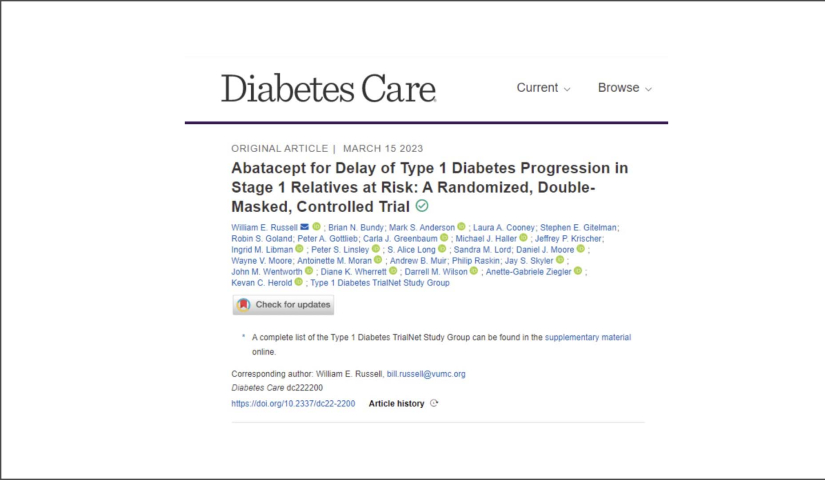
Study findings shed new light on abatacept’s impact on type 1 diabetes progression, suggest direction for additional research
Findings from the TrialNet Abatacept Prevention Study, published online in Diabetes Care, provide important new information about how abatacept impacts type 1 diabetes (T1D) progression and suggest direction for additional research.
The Abatacept Prevention Study opened in 2013 and enrolled 212 people between the ages of 6 and 45. All participants had at least one relative with T1D, two or more diabetes-related autoantibodies and normal glucose tolerance (stage 1 T1D). Risk was identified by TrialNet screening, which detects the autoantibodies that signal the disease in its earliest stages, often years before symptoms appear.
The study found that while abatacept impacted immune response and preserved insulin production during the one-year treatment period, it did not meet the study goal of delaying progression to abnormal glucose tolerance (stage 2) or clinical diagnosis (stage 3). The group treated with abatacept maintained beta cell function better than the placebo group at 12 months. In addition, known effects of abatacept were detected on immune cells. However, 12 months after treatment ended, beta cell function was the same for both groups and effects on immune cells had reversed. The early effect was not sustained.
“Every study gives us critical information that moves us one step closer to our ultimate goal: a future without type 1 diabetes,” said Bill Russell, MD, the study’s Lead Investigator, and TrialNet Principal Investigator at Vanderbilt University Medical Center, in Nashville, TN. “This study helped us learn more about how abatacept works and its impact on disease progression.”
In the treatment phase of the study, participants received 14 intravenous (IV) infusions over one year—three in the first month, then monthly for 11 months. Assigned randomly by computer, half of the participants got the study drug; the other half got a placebo (looks the same as the study drug but is inactive). Neither researchers nor participants knew who was in which group until the end of the study. After the first year, participants visited a TrialNet site twice a year for monitoring until the study ended.
In an earlier TrialNet study for people newly diagnosed with T1D (stage 3), participants were treated with abatacept for two years. At the end of two years, those treated with abatacept had 59% better insulin production and a 9.6-month average delay in progression of insulin loss compared to those who received the placebo. That difference extended out to three years.
“I want to thank all the study participants, families and research teams who made these two studies possible,” said Dr. Russell. “Comparing findings from both studies provides important new information and direction for future research.”
Studying abatacept in both stage 1 and stage 3 opens the door to additional research asking: Will prolonged treatment sustain the beneficial effects we observed over 12 months? Would starting abatacept in stage 2 be more effective? Could combining abatacept with another therapy prolong its impact?
Abatacept (CTLA-4 lg) changes the way immune cells communicate. Marketed as Orencia®, abatacept is currently approved by the FDA for use in children as young as 6 for two types of juvenile arthritis. It is also being studied for treatment of other autoimmune diseases.
TrialNet is currently planning a new study to test abatacept in combination with rituximab, another drug that targets the immune system, in people newly diagnosed with T1D (stage 3). Expected to open for enrollment later this year, this study will be the first to test these two drugs consecutively (one after the other). Separate TrialNet studies showed each drug individually helped preserve insulin production in people newly diagnosed. By combining the two therapies, researchers expect more individuals to maintain insulin production during and possibly after treatment.
The first step for those interested in participating in TrialNet research is to get screened. TrialNet risk screening is free, quick and convenient. You can order an in-home test kit (that uses a fingerstick) or get a blood draw at a local lab or one of TrialNet’s many locations. If screening detects the early stages of T1D, you may be eligible for monitoring and clinical studies to try to change the course of the disease. To learn more, visit www.trialnet.org.




